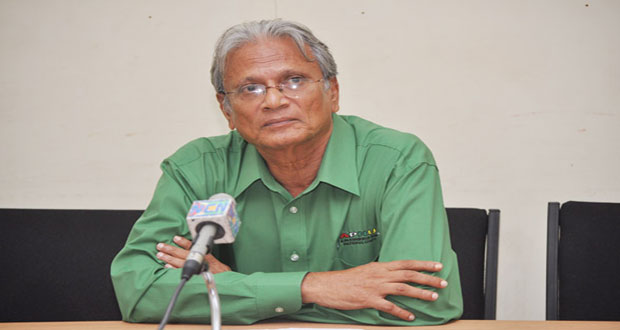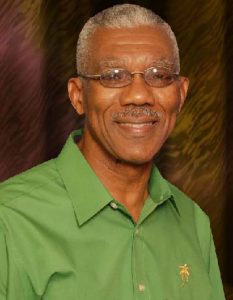Moves afoot to correct debacle in Maths, English – but Education Minister says there’s no quick fix to the crisis
DESCRIBING students’ performance in Mathematics and English at both the national and regional examinations as deeply depressing, Education Minister Dr. Rupert Roopnaraine said he will be consulting with teachers and subject experts as a matter of priority to correct the debacle.Students over the years have not been performing well at these two fundamental subject areas at the National Grade Six Assessment (NGSA) and the Caribbean Secondary Education Certificate (CSEC) examinations, but their performance took a turn for the worse in the past three years.
At CSEC, students’ performance in English counting Grades 1 to 3 showed signs of improvement during the period 2009-2011. It moved from 50.29% in 2009, to 59.16% in 2010, to 60.82% in 2011. But performance in this subject area experienced a dismal slump during 2012-2014. It declined to 37.02% in 2012, increasing to 45.69 % in 2013, and again increasing but minimally to 46.98 % in 2014.

Education Minister Dr. Rupert Roopnaraine says there is no quick fix to the high failure rates in English and Mathematics
Last year, 62% of students who sat Mathematics at CSEC failed to obtain a Grade 3 pass, but the pass rate was the best the country has ever achieved in the subject, even though it was the lowest in the Caribbean in that year.
Overall, more than 50% percent of pupils who sit the NGSA fail to attain a score of 50% percent in both Mathematics and English. Performances in these subject areas reportedly also worsened during 2012 and 2014.
“There is no doubt in my mind that there is a very serious problem in these two fundamental building blocks. The level of failure of these two subjects is deeply distressing. We have to look at the syllabuses; we have to look at teacher training. There is no instant fit to this crisis. We just have to recognise it for what it is; we have to get to the bottom of why this has come about; we have to be very careful in our analysis of why this is taking place and move very swiftly to correct it,” Dr. Roopnaraine said.
According to reports, the high failure rate in the two core subjects is due largely to teachers not identifying and correcting learners’ weaknesses at the primary level.
This happens even though there are a National Grade 2 and National Grade 4 Assessment in place, for that very purpose.
Miserable failure
The primary school assessment system is designed to detect and remedy shortcomings in pupils through the Grades 2 and 4 examinations, so by the time they reach Grade 6, they would be able to master basic concepts in literacy and numeracy. From reports, teachers have been failing miserably in this regard.
And the resultant effect is that many students leave the primary school system unable to do elementary reading and basic calculations. This problem is then exported to the secondary school system when pupils elevate from the primary level, and is a main reason for the high failure rate of English and Mathematics at the CSEC level.
Speaking with the Guyana Chronicle, Dr. Roopnaraine was not oblivious to this weakness in the school system.
“We can move swiftly but the correction will take us some time. All of these matters have to do with the quality of what is being delivered. It is something that we will have to engage our best pedagogical minds on and some of the more thinking elements within the Guyana Teachers’ Union (GTU). We have to make this a national project,” the Minister said.
Dr. Roopnaraine pointed out that while he does not want to make promises which he cannot keep, significant energies will be channelled into reversing the poor performance in Mathematics and English in the next few years.
This crisis, he said, cannot be reversed by the wave of a magic wand, noting that it has to be addressed in every dimension.
“We can’t rush into solutions without careful identification of the problem. It calls for a serious analysis on the delivery of education in the classrooms. There is no quick fix, but there is a fix. We have to act on this quickly as I would like to see these failures reversed,” the Minister of Education told this publication.
Review
A former university professor, Dr. Roopnaraine said all aspects of teacher training will be reviewed and scrutinised, and areas that need to be corrected will be corrected and those that need refining will be refined.
The end result, he said, is to ensure that teachers who leave the teacher training college are fully capable and competent to positively impact the school system.
Recently, Research and Policy Fellow at Stanford University, Dr. Travis Bristol who has worked in Guyana through the World Bank, said improvement in students’ performance hinges on sound management and the quality of teachers in the school system.
“If you raise the standard of those entering the Cyril Potter College of Education you begin to raise the quality of those who leave,” he told this publication in an interview on Facebook.
Meanwhile, at his inauguration ceremony at the Guyana National Stadium last week, President David Granger lamented the crisis in the public education system, but said improvement is on the way.
“Our schools have been producing an increasing number of illiterate and innumerate youths. We shall provide fresh opportunities for young students to be educated as engineers to build bridges and roads to open our vast hinterland and to develop schemes to exploit our hydro-electrical potential.
“We shall train geologists to develop our bauxite, diamond, gold, manganese and quarrying resources. We shall train biologists, botanists, zoologists and agriculturists to expand food production. We shall expand opportunities to improve communication and human learning, and to drive our economy forward at a faster rate. We shall improve information, communication and education infrastructure in hinterland and coastal areas.”
These opportunities, he said, cannot be exploited by the impoverished, the ignorant or the illiterate.
“They cannot be achieved while so many primary school children cannot qualify to enter secondary school or when thousands of children drop out of our primary and secondary schools every year. They can be achieved only by an educated population. We have much work to do to fix the broken public education system,” he said.


